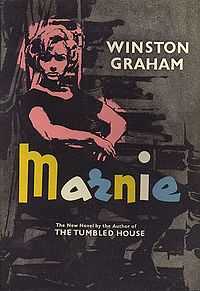Marnie
| Marnie | |
|---|---|
 First Edition UK cover | |
| Author | Winston Graham |
| Country | United Kingdom |
| Language | English |
| Genre | crime novel |
| Publisher | Hodder & Stoughton |
Publication date | 1961 |
| Media type | Print (Hardcover) |
| Pages | 286 p. |
| ISBN | N/A |
Marnie is an English novel first published in 1961 which was written by Winston Graham. It is about a young woman who makes a living by embezzling from her employers, moving on, and changing her identity. She is finally caught in the act by one of her employers, a young widower named Mark Rutland, who blackmails her into marriage. Two shocking events near the end of the story send the troubled woman to the brink of suicide and she eventually must face the trauma from her past which is the root cause of her behavior.
It was the basis for Alfred Hitchcock's suspense film Marnie (1964), where the setting was changed from England to the United States, details of the story were changed, and the ending was changed to a more optimistic one. It was also adapted into a play by Sean O'Connor in 2001.[1]
In Tony Lee Moral's book Hitchcock and the Making of Marnie, Winston Graham revealed that the inspiration for Marnie came from three real-life incidents:
- His younger child's babysitter was a good looking girl who was constantly taking showers and getting letters from her mother about dangers of getting involved with men, and she had a strong interest in riding horses;
- A newspaper article about a woman who changed her appearance as she moved from job to job stealing money from her employers;
- A wife with three children whose husband was away at sea, slept with many sailors, became pregnant, killed the baby soon after it was born, went to trial and was acquitted by reason of temporary insanity. Soon after that, her young son started stealing things.
Current edition
- Marnie, (House of Stratus, 2002). ISBN 0-7551-0900-7 (hardbound reprint)
References
- ↑ Lyn Gardner Theatre Review: "Marnie", The Guardian, 24 January 2001